Russia sees 'no reason' to halt weapon support for Syria
Loading...
| Moscow
Russia has no intention of rethinking its weapons sales and military cooperation with Syria, despite the spiraling death toll in the country, a senior Russian official said Tuesday.
"Russia enjoys good and strong military technical cooperation with Syria, and we see no reason today to reconsider it," Deputy Defense Minister Anatoly Antonov told journalists in Moscow.
Several outstanding arms deals will be fulfilled, and Russian specialists will be made available to train Syrian troops on the new weapons, he added. "It's part of our contractual obligations," said Mr. Antonov. "When we supply weapons, we have to provide training."
The United Nations estimates that more than 7,500 people have died in the nearly year-long uprising against President Bashar al-Assad. Russia, joined by China, has used its UN Security Council veto to block any concerted international action on the crisis, and lately has grown even more outspoken about what it sees as an attempt at Western-sponsored regime change against a traditional ally of Moscow.
Russia has furiously denounced alleged Western efforts to aid the beleaguered Syrian rebels, including what Russia says are secret channels used to inject arms and mercenaries from abroad to fuel the civil conflict.
Russian foreign minister Sergei Lavrov told a UN Security Council session Monday that "interference from outside, using raw military force, increases the illicit spread of arms, thus jeopardizing stability in the region."
But US Secretary of State Hillary Clinton said the West sees Syria's crisis as a brutal, unpopular regime cracking down on a largely helpless population. "We reject any equivalence between premeditated murders by a government's military machine, and the actions of civilians under siege driven to self-defense," she told the Security Council.
Russia's hardening line plays into a narrative that sees the Kremlin return of Vladimir Putin leading to a growing anti-Western drift in Russian foreign policy, and raising fears that the delicate "reset" of relations between Moscow and Washington may be doomed.
But some Russian experts say the West is as much to blame for the dialogue-of-the-deaf that's unfolding, and that with a little effort the West could come to terms with Moscow over what to do about Syria.
Russia is simply being told that it should get on board the Western train, and unquestioningly do what the US says is the right thing, says Viktor Kremeniuk, deputy director of the official Institute of US-Canada Studies in Moscow.
"But we're not allies, we're not like-thinkers who can just be expected to act in a certain way," he says. "That doesn't mean we're not reasonable people, who can be flexible and pragmatic when necessary. But in Libya, Russia felt like it went along with international action, and then was just pushed aside and expected to give up all our positions. Why would we accept that again? We need to know: What's in this for us? You want to do a deal, make an offer."
Russia has about $5 billion in outstanding arms contracts with Syria, plus as much as $15 billion in other traditional military and economic cooperation – including Russia's only foreign military base, a naval refueling station at the Syrian port of Tartous.
"It's clear that Russia's attitude is hardening, but it's our perception that the West is adopting tougher positions as well," says Sergei Markov, vice president of the Plekhanov Economic University in Moscow, and Mr. Putin's "special electoral representative" during the recent presidential elections.
"Russia believes Western attitudes are becoming more and more politicized. They want to kill Assad, figuratively and perhaps literally, and Russia will never agree to support this," Mr. Markov says.
But, he adds, the Kremlin still thinks Assad has a good chance to gain the upper hand in Syria's civil strife. "When it becomes clear who will win, Assad or the rebels, then maybe the Russian position will change. Obviously, we will move with events, and hope the West will also."








